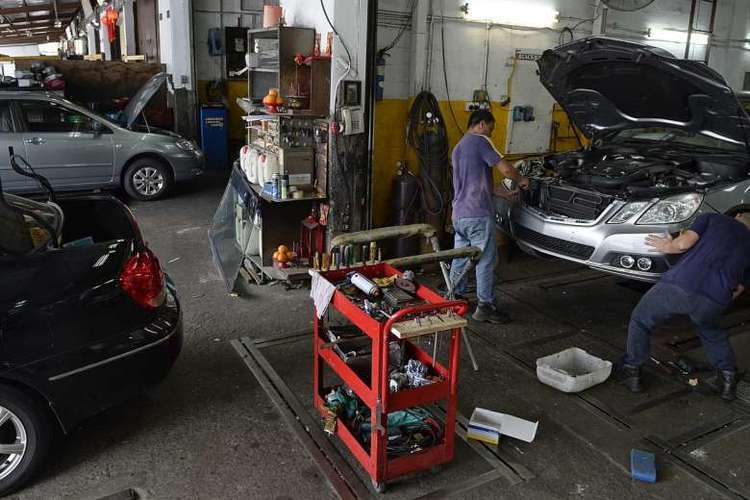Five Dos and Don'ts of Car Maintenance
 (Photo Credit: Pexels)
(Photo Credit: Pexels)
Car maintenance can be a hassle but is very much necessary to keep our cars running in the best shape there is. Here’s our list of five things you should and should not do when carrying out car maintenance to ensure your car is running as smoothly as possible.
The cost of cars rising constantly makes having one all the more valuable to us. As such, it is important to maintain our vehicle in proper condition at all times. Neglecting adequate car maintenance will cause more harm than good to your car in the long run.
It can be a pain to take note of all you’ll have to do to maintain your vehicle and ensure it is in the right working order. Therefore, we’ve compiled a list of all the most important things you should and shouldn’t do, in relation to car maintenance.
Without further ado, here’s our list of five dos and don'ts of car maintenance.
Dos Of Car Maintenance
1. Do replace your Air Filter Every 12 Months or 12,000 Miles
 (Photo Credit: Singapore Car Servicing)
(Photo Credit: Singapore Car Servicing)
One of the must dos of car maintenance is replacing your air filter. The air filter of your car ensures that the engine is running smoothly and safely enough for significant distances. Singapore being a city means that often, the outside pollution mixes with your air filter and affects the effectiveness of your engine. Once that occurs, your air filter definitely needs replacing.
Replacing your air filter is a task that can be easily accomplished at home. Air filters in Singapore can be bought at a relatively cheap price of S$10, with the more expensive ones falling in the price range of S$60 to S$100.
Once you’ve acquired a new air filter, all you will need to do is open your hood and locate where the air filter box is. It can be identified as a black plastic box on top of or beside the engine of your car. After opening the air filter box, remove the old air filter and replace it with the new one. It is recommended that you change your air filter every 12 months, as the effectiveness of your engine can often be severely hampered by the cleanliness of your air filter.
2. Do Clean Your Battery Terminals
 (Photo Credit: Dremels)
(Photo Credit: Dremels)
Another important task regarding car maintenance is the cleaning of your car battery terminals. One of the most crucial components of your car is the car battery, which keeps your vehicle running as smoothly as possible. Over time the car battery terminals will accumulate grime or become corroded. This will most definitely affect how smoothly your car runs.
The procedure for cleaning your battery terminals is fairly simple. Firstly, you’ll have to open your car hood and inspect your battery. If it is cracked or seen to sport severe damage, it would be best to replace the entire battery. A heavily impaired battery could hamper the performance of your vehicle.
Secondly, you’ll have to lift up the cover of the car battery to check its clamps and cables. Before you start cleaning the battery terminals, disconnect the car battery by removing the clamp with the ‘-’ sign, followed by the ‘+’ sign. It would be recommendable to purchase a cleaning agent for cleaning your battery terminals, instead of making your own.
After cleaning your battery with the cleaning agent, be sure to give it a rinse with a little water. Ensure that you do not end up washing the cleaning agent into the battery vents. Doing so will affect the battery life of your car battery. After drying it off, affix the clamp with the ‘+’ sign instead of the ‘-’ sign.
3. Do Change Your Spark Plugs
 (Photo Credit: SG Racing)
(Photo Credit: SG Racing)
A common cause of your car engine not functioning at its best could be the spark plugs. Like with other car components, if worn out and covered in grime, the spark plugs will affect the efficiency of your engine.
To locate the spark plugs in your car, you should refer to the owner’s manual to gauge where they are. For four-cylinder engines, the spark plugs can usually be found on top of or beside the engine in a row. For six-cylinder engines, the spark plugs are located on top of or beside the engine head.
There are a few tell tale signs of the spark plugs requiring replacement. They are as follows; if you have trouble starting your car, the engine misfires, it sounds rough at idle, or the engine has trouble accelerating. In addition to these symptoms, you’ll need to check the spark plugs itself to consider if it needs replacing. Typically, if the plug tip and side electrode of the spark plug have turned black, it is a red flag that the plug needs replacing. In addition, detonation damage is also a sign that you’ll need to replace your spark plugs.
4. Do Check The Air Pressure In Your Tires

An essential part of car maintenance is checking the air pressure in your tyres. If the air pressure in your tyres is too low or too high, it could lead to your tyres wearing or blowing out in addition to poor mileage. It is therefore important to ensure your tyres are maintaining the proper air pressure at all times.
For the appropriate amount of air pressure, you can refer to the owner’s manual or to the inside of the driver’s door. To check the air pressure, unscrew the valve stem cap from the valve stem on the tyre before measuring the air pressure with an air pressure gauge. If the reading you receive is more or less the same as the specifications you were given, there is no need to change the air pressure in your tyres.
Read More: Tyre Safety Tips Every Driver Should Know
5. Do Check Your Brakes
 (Photo Credit: Torque)
(Photo Credit: Torque)
Brakes are a necessary part of ensuring our drive runs smoothly and safely. Failing to check if they are operating well may result in accidents that could have been avoided otherwise. Reasons for brakes not operating properly are as follows; faults in the rotors, the brake fluid, the brake pedal or the brake pads.
In order to inspect whether your brakes are in proper working order, you’ll need to check the brake fluid reservoir as well as the brake pads. If the colour of the fluid is dark, it requires a change and if the level of fluid is low it needs a refill. If the brake fluid reservoir is empty it would be best to replace the fluid. To check your brake pads, do take your car to a service center. While it may be a lot of hassle, it is much preferable to the alternative of getting into a car accident.
Don'ts of Car Maintenance
1. Do Not Drive With An Overheating Engine
 (Photo Credit: Singapore Car Repair)
(Photo Credit: Singapore Car Repair)
Like with all appliances, a car’s engine will get hot over time if used consistently. Normally, the car’s cooling system will come into play to prevent the car’s engine from heating up too much. In the event that it doesn’t, it is vital that you stop your car and call for a tow immediately.
An overheating engine can often be dangerous for your vehicle, leading to faulty car components such as warped cylinders and cracked head gaskets. Extensive repairs will be required to fix these issues and will most definitely lead to a heavy bill.
Therefore, to prevent your engine from overheating in the first place it is crucial that you take certain precautions such as checking your car’s coolant and radiator regularly, or checking for leaks. It may seem troublesome but will be that much worth it in the long run when you avoid paying hefty repair bills for your vehicle.
2. Do Not Just Use Any Cleaning Agent To Clean Your Rear Windshield
 (Photo Credit: Pixabay)
(Photo Credit: Pixabay)
Cleaning the windshield is an important component of car maintenance. When doing so, it is important to note that a proper, recommended cleaning agent should be used, instead of any cleaning agent. For example, home glass cleaners contain ammonia, which can cause the heating elements contained within the rear window to break down.
Therefore, instead of resorting to any cleaning agent, opt for the ones that come recommended for cleaning your windshield. An example would be the Bullsone RainOK Speed Spray, which enables your newly cleaned windshield to be rain- repellent. The Sonax Clear Glass is also an excellent alternative, with reviews proving it to be effective on a minimal amount.
Read More: The Complete Guide To DIY Car Washing
3. Do Not Ignore Recall Notices
 (Photo Credit: Getty Images)
(Photo Credit: Getty Images)
Often, even after careful amounts of research and experimentation, defects can still arise in the cars you’ve purchased. For example, there could be a flaw with the acceleration or brake pedals, or with the cruise-control function. When that is the case, you will be sent a recall notice so that the automakers can repair the defect.
Ignoring such recall notices, which usually come in the mail, can put you and your loved ones in danger. While some defects may be minor, others are usually life threatening and can pose a serious danger to your safety. Although it may come at the cost of the price you’ve paid for your vehicle, it is much more preferable than having a serious accident occur.
4. Do Not Attempt To Save On Auto Repair
 (Photo Credit: The Straits Times)
(Photo Credit: The Straits Times)
The financial situation for cars isn’t the best in Singapore right now, with prices rising. However it is important not to let the urge to save up on money however you can cloud your judgement. Saving up on money by buying the cheapest parts may in comparison, cause your vehicle to suffer instead.
The same logic applies to mechanics as well. The better auto mechanics may be costly, but they are well trained and experienced enough to ensure your vehicle is returned to you in optimal shape. Saving up on money by referring to the cheapest mechanics possible may conversely cause more damage to your vehicle in the long run.
5. Do Not Skip Oil Changes
 (Photo Credit: Motorist)
(Photo Credit: Motorist)
Skipping an oil change for any reason- be it you were too busy, or you had other matters to attend to- can spell trouble for your vehicle in the future. The engine oil contained within your car is one of the most essential parts of it, ensuring that your car runs smoothly.
Like with all components of the vehicle, if left for too long the engine oil of your car will collect dirt, metal and other particles that will prevent your engine from running smoothly. In addition, oil does break down over time, causing sludge to form in the engine and preventing it from functioning adequately. To prevent this from happening, simply remember to change your engine oil.
Following our list for car maintenance will ensure that your vehicle will be kept in excellent condition for a long time. Have we missed out any vital tips for car maintenance? If so, let us know in the comments below!
Super App for
Vehicle Owners
Read More: 7 DIY Car Hacks that Can Help You Save Up to $750
Download the new Motorist app now. Designed by drivers for drivers, this all-in-one app lets you receive the latest traffic updates, gives you access to live traffic cameras, and helps you manage LTA and vehicle matters.

